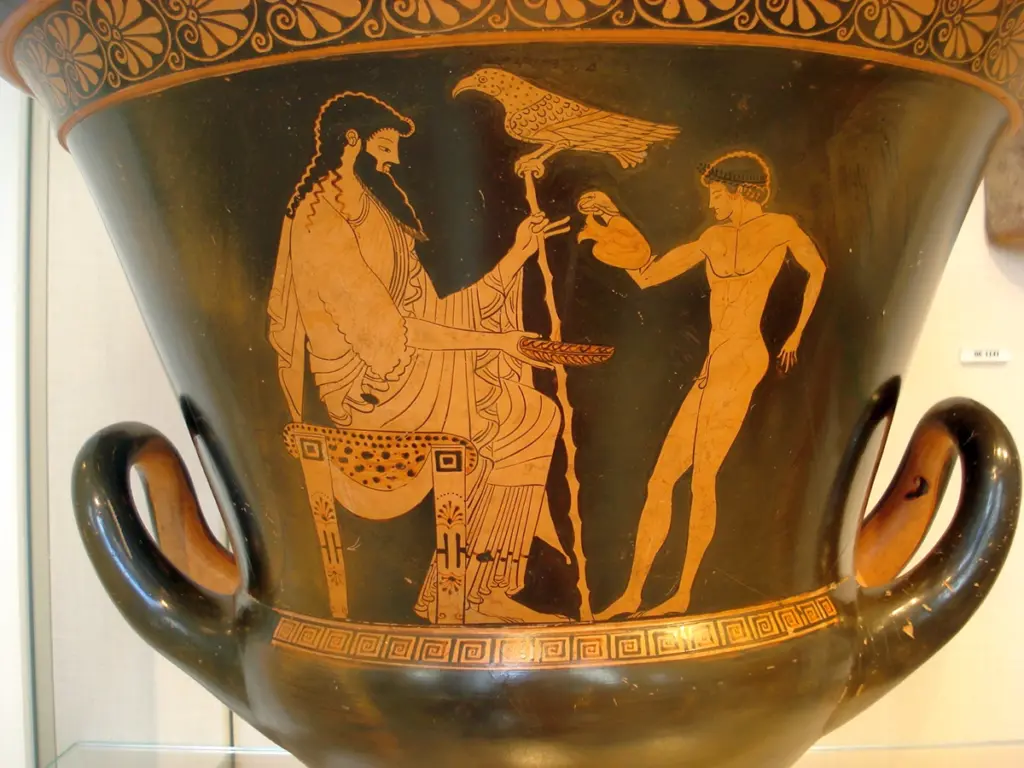
The office of cupbearer has a dignified lineage. Its holders were required to be both supremely trustworthy and, almost as essential, supremely beautiful. In the Greek myth, the mortal youth Ganymede is abducted by the permanently meddlesome gods to serve as cupbearer to Zeus himself. In the words of Homer in the Iliad: “he was the handsomest mortal man on earth – / and so the immortals, awestruck by his beauty, / snatched him away to bear the cup of Zeus / and pour out wine for all the deathless gods” (Book XX, ll 269-72).
In other words, having been ushered into the executive lounge, he might as well make himself useful. He took over the role from Hebe, who had married Herakles, but he quickly became the favorite. In the 5th-century BC vase painting of Eucharides, the lad is shown, butt-naked except for a laurel headdress, pouring wine into the flat cup held out by a seated Zeus.
By contrast, Rembrandt’s stark depiction of Ganymede’s abduction shows the youth as a small child, squalling and peeing in terror as Zeus’ eagle clutches him in its talons.
Already in Pharaonic Egypt, the cupbearer had become one of the most elevated members of the royal household staff. Genesis 40 relates an incident in which both the chief cupbearer (or “butler,” as the Authorised Version has it) and the court baker have fallen from favor with the King, and are slung into the same prison where Jacob the patriarch’s son Joseph is held. It is not insignificant that it is the cupbearer who is persuaded by Joseph to press his case with the King. Anticipating psychoanalytic technique by three millennia, Joseph successfully interpreted a dream of the cupbearer’s, in which he pressed the grapes of a triple-branched vine directly into the Pharaoh’s cup. The three vine branches represent the three days that will elapse before he is restored to his position at court. It was a good guess. In three days’ time, it was the Pharaoh’s birthday, and a birthday bash without the pouring of cups is unthinkable. The poor baker, again as Joseph prophesied, was hanged, while the ingrate cupbearer forgot to put in a word for Joseph after all.
I was the King’s cupbearer
The author of the book of Nehemiah in the Hebrew Bible is a Jewish official at the Persian court of Artaxerxes I: “I was the King’s cupbearer,” he proudly declares at the close of the first chapter. He requests the King’s permission to return to Jerusalem and help rebuild the smashed walls and burned-down gates of his ancestral city. He is emboldened to put the entreaty when the King notices his clouded countenance as he pours the wine. What is noteworthy about a scenario such as this is that it is precisely because the cupbearer has to be a trustworthy man of spotless character, in other words not likely to poison the wine the King and Queen are served, that he can give voice to such a heartfelt request. The King not only grants it, but helps to facilitate the mission for him.
At the Byzantine court, the post was at first restricted to eunuchs, who were guaranteed not to become embroiled in any erotic mischief, but by the 11th century, it had been extended to the sexually unmutilated too. The Byzantine emperors had not traditionally regarded the cupbearer in as exalted a rank as his historical predecessors in the Assyrian, Egyptian, and Greco-Roman worlds. As long as he had not forgotten to hang a goblet around his neck, for those moments when the Emperor felt like a drink, he was another of the useful servants. With the flourishing of the Komnenos dynasty in the 11th and 12th centuries, however, the post assumed greater dignity until it started to be awarded to soldiers of the most senior rank, even members of the Emperor’s own family.

The role of cupbearer endured through the medieval era, and into early modern times. Shakespeare turns the Biblical device of the cupbearer’s closeness to the King into a splendid bit of intrigue at the very opening of The Winter’s Tale, when one King, Leontes, commissions their shared butler, Camillo, to poison the wine of another, Polixenes, whom he suspects of having an adulterous dalliance with his, Leontes’, wife Hermione. Camillo stands accused of being “a gross lout, a mindless slave” if he claims not to be able to see the evidence of the Queen’s infidelity, whereas, if he would but use his proximity to Polixenes, he “mightst bespice a cup / To give mine enemy a lasting wink / Which draft to me were cordial” (I:ii). A punning murder, then. The spices with which wine was traditionally infused would disguise the toxin’s taste, and put the adulterer to sleep for good, the venomous cordial producing a cordial mood in the cuckolded Leontes. Again, it is the trustworthiness of the confidant that makes him a useful pawn in the game.
The restaurant sommelier, as we now call him or her, retains something of the role of the trusted confidant today. We need them to be able to determine whether an odd-tasting wine is entirely healthy, to pour a well-kept wine off its sediment, perhaps to suggest wines to accompany whatever it is we have ordered. They may be trusted ambassadors for the kitchen, and shrewd evaluators of the customer’s taste. And we can be reasonably sure they won’t, at the behest of the shady-looking huddle at Table One, lace our Albariño with nux vomica.






